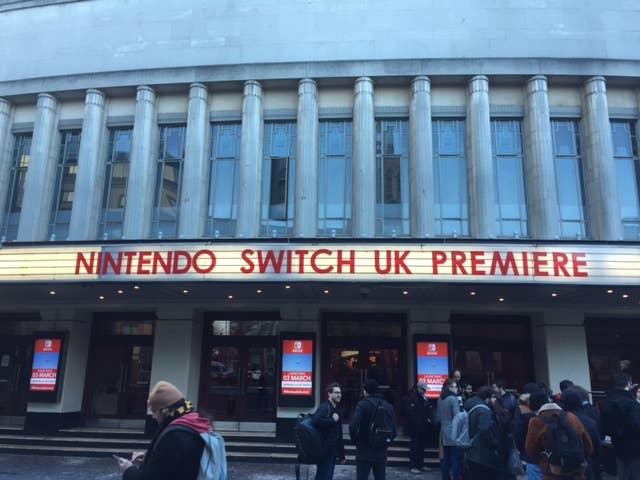Hands-on with Nintendo Switch
We attend Nintendo's London Premiere to play Splatoon, Zelda, Arms, 1-2-Switch and Mario Kart
Mere hours after the reveal of Nintendo Switch, GamesIndustry.biz was invited to attend a special event in London to go hands-on with the device.
There has been much analysis around the machine's price, its line-up, third-party support and market positioning, so rather than dwell on those important issues, I'll instead focus on the quality of the products and whether they offer good value for money.
Nintendo events are quite unique in the games business. There was no sound of virtual gunfire at London's Hammersmith Apollo, and the only 'adult' game was the 12-rated The Legend of Zelda: Breath of the Wild. It was also a room full of journalists, publishers, developers and celebrities, who couldn't stop grinning at the ludicrous Milk mini-game from 1-2-Switch (it's a game where you use one of the Joy-Con controllers to milk a cow whilst staring into the eyes of your opponent) and the brawler Arms. There were a lot of people enjoying themselves here.

The hardware itself is impressive, and it's clear to see why the machine has a $300 price point. This feels like a sleek, well-built gaming device - more like a large PlayStation Vita than a slimmer Wii U Gamepad. The controllers are also packed with functionality. By far one of the more impressive elements was the HD Rumble, which is well demonstrated by a mini-game in 1-2-Switch. The game challenges you to guess the number of ball bearings in a box by tilting a single Joy-Con, and it feels like balls are rolling around inside the controller - which enable you to guess. It isn't an especially deep experience, but it was a nice demonstration of the technology - although it'll be interesting to see if developers are able to make use of it in full-size titles.
The Joy-Con controllers are more comfortable than I expected considering their tiny size. Despite our concerns, playing Mario Kart with one Joy-Con is perfectly serviceable for those that want to play the game together on a plane or in the back of a car - although it's no replacement for a traditional pad, as your hands can end up swamping these small controllers.
Much discussion has centred on the Switch's screen, and despite some concerns around the resolution, we didn't notice any significant downturn when compared with the full TV version. In one instance I even moved from playing Splatoon 2 on the TV with the Pro Controller to the Switch screen, and although obviously the screen was now smaller, I didn't notice any significant downgrade in terms of visual quality.
Splatoon 2 and The Legend of Zelda: Breath of the Wild were both playable and good examples of high-end Switch products. However, the Zelda demo was largely the same as the one we played at E3 (and seemed to not quite run as smooth as the Wii U edition), and it's hard to see why Nintendo feels able to charge an extra £20 for it - even with its portable functionality.
Yet the games we found most entertaining in the event scenario were the motion control titles. Arms is probably our favourite game from the show, a new IP from Nintendo that really expands upon the Boxing mode in Wii Sports. There was a definite feeling of skill to dodging, blocking, jumping, punching, grabbing and unleashing special attacks, rather than just frantically flailing your fists at the screen. We've not experienced many motion-control titles in recent years, and it's nice to see how far the technology has come.
"As a piece of technology, Switch is Nintendo's most impressive machine so far."
Then there's 1-2-Switch. Not a single mini-game in this collection offered much depth - it felt more like a string of quick micro games than anything substantial. Yet what makes this title quite unique is that you rarely need to look at the screen, and instead try to stare out your friends whilst milking a cow, pulling poses or engaging in a shoot-out. It was certainly a different experience, if a somewhat shallow one.
And here lies the biggest challenge of Switch - who is it for? Mario, Zelda and Splatoon will undoubtedly attract Nintendo's core user base. The numerous JRPG titles will appeal to that audience, but what about beyond that? The games that received the most space in London were Arms and 1-2-Switch, but these games are clearly built for mainstream audiences, and it's hard to see them appealing at these prices. 1-2-Switch is a collection of tiny, simplistic mini-games for $50/£40. Arms costs $60/£50, and to play local two-player (there is an online option) you'll need a second set of Joy-Con controllers that will set you back $80 or £75 - I thought Arms was great, but £125 great? Not a chance.
I said I wouldn't dwell on the price, but it is hard not to. The games we played (and there weren't that many, hopefully there will be a lot more at E3) were fun and the hardware was well put together, impressive to the touch and packed with features. This is a good games console, but one that has yet to justify its high barrier to entry. It may struggle until Nintendo packages one of its bigger upcoming games in with the hardware (for no extra cost).
As a piece of technology, Switch is Nintendo's most impressive machine so far - and a significant step-up over the underwhelming Wii U. But it still has a job on its hands to convince people that it's worth the asking price.
